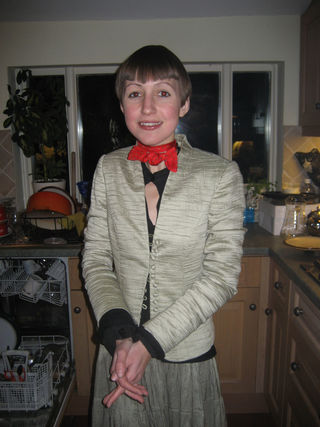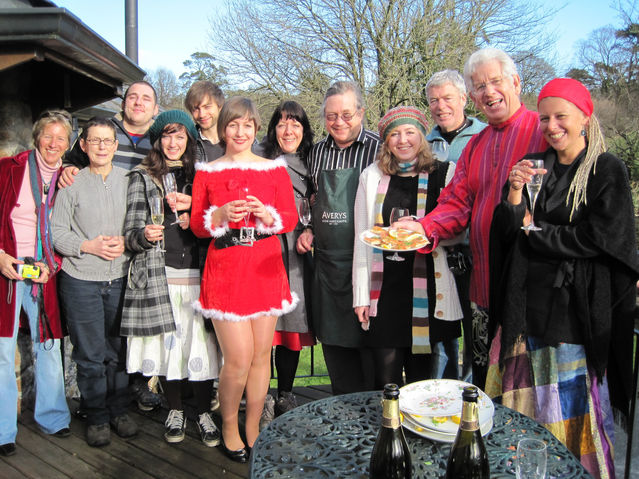Stress
My Second Grown-Up Christmas, Eating
Festive eating and drinking, impossible for so long
Posted December 30, 2009
This is the second Christmas I've had as an adult, eating. It's been lovely and slightly stressful by turns. I find it funny how the normality I've achieved, just eating with my boyfriend or with my colleagues or with friends, every day, has now been turned into something of a novelty, even while remaining still completely normal. With so many people - thirteen for the day itself, nine left now - and being in my mother's house, there's the inevitable cumulative tension of meal after meal en masse, with all the rich plethora of food that Christmas is about. This lunchtime someone thought it a good idea to make fried potato cakes, and someone else wanted salad, and I was heating soup, and suddenly there were about five cooks in the kitchen, and the potato cake-frying went on for the whole meal, and the radio was murmuring to itself in the corner, and I was asked by almost everyone round the table whether I was sure I didn't want any of the potato cakes - and everything seemed suddenly unbearable. Unbearably complicated, wasteful, tiresome, tiring, irritating. I suppose food will be a flash point for me for years to come, and especially at Christmas, but at least this time I just kept quiet, ate, and crept off for a sleep, instead of running off and bursting into tears as I think I would have last year.
I've asked everyone here - my boyfriend and his mother, my mother and her partner, my father and his partner and her daughters and one of their boyfriends - to fill in a little booklet with three sections:
- How I seemed last year
- How I seem this year
- How they hope I'll be next year
I've just had my boyfriend read it to me, with some tea and a biscuit, and it's moved me to tears. Just the loveliness of all the comments, and the perceptiveness, and the caring they all radiated, coming on top of this unexpectedly difficult lunch, at which I wish I'd been more convivial, made it unbearably touching. The first one that really got to me was from one of my father's partner's daughters; she wrote:
- (last year) positive, friendly, kind, welcoming, a little reserved, ‘in own world', thoughtful, special, sensitive, nice
- (this year) laughing, cheerful, happy, warm, friendly, a tiny bit to herself (but in a Christmas with 13 people can be a bit much way), interested, interesting, calm, glowing
- (next year) very very happy, self-confident, content and more!
For her it's really been like a comparison of two snapshots of me: last year, the Christmas of precarious transition, and now that of a confirmation of change. Then, I'd been eating more for five months, and my weight had reached 52 kg or so, but everything was still so new to me, so fragile - so hopeful but still so fearful - and still for everyone else so scary, probably: wondering whether this would last, could last, or was just an interlude of trying to eat. I was still having private chocolate drinks and cereal bars and portions of chocolate last thing at night. I was still fearful of what would come, fearful of how much more the weight would go up, of how much longer the insatiable hunger would last, of how much more I'd change into someone new.

Now I'm almost twenty kilos heavier, my body feels my own, if still a novelty, my sleeping and waking coincide with other people's (though I'm so tired from the term's teaching and the final submission of my thesis that I'm sleeping more than anyone else), and my retreats to my room aren't necessarily prompted by the old anorexia. It's difficult trying to disentangle, now, remnants of my illness from facets of my long-submerged character: if there is in me a pleasure in solitude verging on reclusivenes, then is that just me, or is it the lasting effect of having sealed myself off from everyone for ten years? If I get impatient with other people taking over things in the kitchen, is that the remnants of food-related compulsions to control, or a quite ordinary reaction to 'too many cooks spoiling the broth'? What does it mean for something to be a character trait irrespective of the last ten years of accumulated experience? Do I look back to my sixteen-year-old self for clues, or my ill self, or some mixture of them, or do I just start again, letting emerge what will and not worrying too much what comes? I suppose the latter, but it's hard sometimes, trying to judge what's valid and what must still be overcome.
Nevertheless, not everything is relative: there are many clear contrasts between the past year and the ten years preceding it, and as many ways in which I'm simply more myself, whatever that means, than I ever could be when I hadn't the energy to be anything much at all. There was one awful Christmas when I'd just finally split up with my first real boyfriend (who'd lived in my father's house). He had been the one to help me escape from starvation in the past, and whose loss now only made eating all the more difficult. I wrote in my diary:
A day not as dreadful as I'd feared. I managed to drink - champagne, dessert wine - and eat - sprouts, chestnuts, spuds, parsnips, gravy, carrot, later Christmas pudding and chocolate. I even managed to smile and talk. Only after all was finished and S [my mother] and J [my brother] departed to join A [my mother's partner] already ill at home in bed, only then could I not bear any of it, not prevent myself crawling into M.'s [my ex-boyfriend's] room, sitting leant against the end of his bed, smelling and feeling him all around, texting him to wish him a happy Christmas... I sat there staring at the carpet - his carpet, matted with his copper-coloured hairs - till T. [my father] came in and rescued me, told me it probably wasn't best to sit in this room full of ghosts, but when I didn't move sat there with me and comforted me with closeness and warmth and words - telling me we didn't fuck up, we had a relationship that was a joy to behold, we never went through the shit of enmity and recriminations; that I'm strong and clever enough to pull myself up out of the hole, that I have to do so, or I'm fucked; that the little practical things, the day-by-day improvements, are what must be focused on. It was all said gently, helped no doubt by wine, but not any less needed and effective for that. The thing is that I need first of all to give up all hope, and I can't. It also seems deeply sadly ironic that the hole M. helped pull me out of at the beginning feels so very similar to the one I'm left in at the end. (25.12.02)
There were two holes, one of emotional despair, one of anorexia, and my father had, by giving them the same image, to some extent allowed me to leave the two confused: when I wrote that the holes of beginning and ending felt the same, did I already admit what must be my emotional survival strategy - admit that I was only clever and strong enough to pull myself out of misery by letting myself slide back into self-deprivation, more deeply than ever before? In any case, it was all I could do, all I did for six more years: my chosen war of emotional recovery was waged through day-by-day relinquishments: my improvements happened by diminishing, distancing, deadening.
Two years later, I wrote about how I dissolved into tears on S.'s shoulder the day before the Christmas family gathering, at the difficulty of it, the dread with which it fills me. She made a plan to help shorten, if not soften, the horror: I was allowed to escape early by train but would have to eat one communal dinner for the sake of my grandparents and appearances.
All the pain of eating with other people here has been followed by sneaky trips to the pantry to guzzle surreptitiously fragments of cake and biscuit and muesli - and now I'm anticipating the chocolate and reading, the thought of which has been largely what's kept me going through this miserable day of dreading the tension, the pressure, the raised voices... (03.01.04)
I haven't kept a diary this year, but the fun of wearing, all Christmas day, a silly sexy Santa outfit given to me by my boyfriend, and of being woken by him to open our stockings together, and of eating and drinking all day with everyone else, was irrefutably new to me, yet irrefutably something that gave me great pleasure. And not only me, but also those who remember my struggles to wake before noon, my joining in with the drinking, most years, but not with the eating (being given a minimal plate of food and picking at it, embarrassed but frightened), sometimes drinking enough on an empty stomach to throw up and have to go to bed, longing for it all to be over so that, once I'd cleared up all the mess of the grand meal, I could finally eat something myself, exactly the same as every other day. Mine was a uniformly grey existence, only now and then caught in the brightness of other people's happinesses, before I retreated again into my own shadows dressed up as delights: chocolate on my own in bed with everyone else long asleep.
In one sense all this dressing up and joining in is new to me, but in another, it feels like recovering a whole personality that was for so very long submerged by hunger. My mother wrote in my little anorexia booklet:
- (last year) hopeful, uncertain, fast-changing, as though on the edge of something
- (this year) calm, happy, shapely, bubbly, tired (but not in an ill way)
- (next year) employed, still calm, shapely, bubbly and happy but not so tired, post-doctoral

Last year I was on the edge of something, and now that something has materialised. The inner calm isn't quite as complete as the outer, but it is greater than at any time in my adult life. The dreadful mixture of fear and guilt that plagued me all the time I was starving has gone - except for little retrospective pangs of guilt that it lasted for so long.




